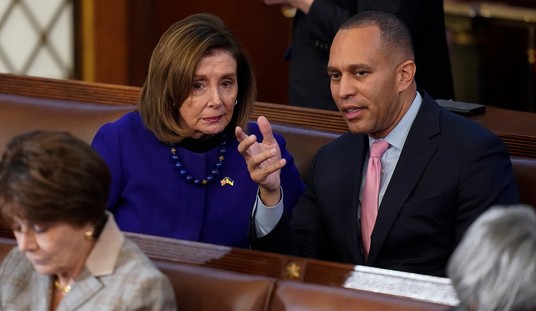Democrat mega-donor George Soros, the lead financer of the institutional left in America, used U.S. Agency of International Development (USAID) disbursements to fund color revolutions in the Balkans, according to U.S. spending hawks.
USAID gave several Soros groups millions of American tax dollars that allegedly went toward stoking social unrest in the Balkan Peninsula, including collaborative efforts to destabilize Macedonia's democratically elected center-right government and ultimately overthrow it.
Macedonia is a broadly conservative country with a flat rate tax of 10 percent, one of the lowest in all of Europe, and a governing right-wing party (VMRO-DPMNE), whose camp won the 2024 parliamentary elections in a landslide against the incumbent pro-European Unionism coalition.
With a population of just 1.8 million, the landlocked nation was situated at the center of Europe's migration crisis that erupted in 2015. To curb the influx of illegal immigrants flooding in from the Middle East and Africa, Macedonia built a barbed-wire fence along the Greek border modeled after Hungary's barrier. Soros, an open borders advocate encouraging mass migration, around this time lambasted Hungarian Prime Minister Viktor Orbán for prioritizing national security over the housing of foreign nationals. "Our plan treats the protection of refugees as the objective and national borders as the obstacle," Soros said.
In 2016, USAID awarded the Macedonian Young Lawyers Association (MYLA), a beneficiary of Soros bucks, about $345,000 in grant money to "protect the human rights of migrants and refugees." According to a quarterly field report, "made possible by the generous support of the American people through the United States Agency for International Development (USAID)," MYLA provided legal assistance to more than 450 migrants in Macedonia since the program's implementation. The two-year Migrant and Refugee Human Rights Protection Project also involved "storytelling evenings" and art therapy workshops where immigrants illegally residing in Macedonia created crafts. As part of the project, USAID opened a "Humanitarian Art Bazaar" to showcase the illegal alien artwork.
This was on top of $600,000 that USAID already handed MYLA for a separate 2014 - 2017 Defending Human Rights Project.
According to a document celebrating 25 years of Soros operations in Macedonia, MYLA signed a memorandum of cooperation with the Ministry of Interior to gain access to closed institutions, such as a detention center for foreigners who have "irregularly entered" Macedonia. To further facilitate the movement of migrants, MYLA also put public pressure on Macedonian Railways to scrap its transport fees for refugees.
With the help of USAID, Soros was simultaneously involved in Macedonia's 2016 color revolution, according to researcher Matt Palumbo, author of "The Man Behind the Curtain: Inside the Secret Network of George Soros."
USAID cash flowed through Soros-tied funding vehicles and would go on to a nexus of non-governmental organizations (NGOs) in the field allegedly acting as foot soldiers "in service of his policies." Macedonians adopted the term "Sorosoids" to describe his on-the-ground NGO actors, much to the chagrin of Soros-sympathizing media.
An activist named Jasmina Golubovska, an operative for one of these NGOs, the Soros-linked Legis, became the face of Macedonia's color revolution when she planted a lipstick-smeared kiss on a policeman's riot shield. Once she emerged as an "icon" of the uprisings, Golubovska embarked on a media circuit and announced her intentions: topple the government then "start from scratch."
Recommended
NGOs like Legis were the infantry, and such Soros-backed activists acted brazenly about it, sporting T-shirts apparently calling themselves the "Soros Army."
Еве една посебна со Павле Полче. pic.twitter.com/rZ5PCdezIf
— ☀ М (@arozgj) February 8, 2025
One of the most vocal revolutionaries, Pavle Bogoevski, who ended up a member of Macedonia's parliament, was photographed mid-protest hurling projectiles while wearing a "Soros Army" shirt. Bogoevsk, an activist with another Soros migrant mover, the Helsinki Committee for Human Rights in the Republic of Macedonia, which got a $300,000 grant from USAID grant in 2016 for an LGBTI Inclusion Project, was charged with "participation in a mob that commits a criminal offense" over the paint-bombing of government property.
Hungarian media outlet Átlátszó, a Budapest-based Soros grantee and NGO, said they created the "Soros Army" merch "as a joke" for their crew members. Átlátszó claimed that Bogoevski and his comrades just jokingly donned the apparel in response to critics calling them Soros mercenaries.
Borjan Jovanovski, a journalist for NOVA TV, a USAID-funded media enterprise, also posted pictures of himself in the same "Soros Army" shirt. In the 2010s, USAID's logo appeared in the closing credits at the end of Jovanovski's NOVA TV show.
Soros army :) :) :) pic.twitter.com/2HsIojzngE
— ШеⓂ️са (@She_MsA) July 25, 2018
In a 2017 interview with Republika, a newspaper in Macedonia, former Macedonian Prime Minister Nikola Gruevski said Soros had "decisive influence" over his country's politics via "a monopoly in the NGO sector."
"If they need a so-called colorful revolution, then they do it through NGOs with money," lamented Gruevski, then-leader of the country's conservative VMRO-DPMNE party until his resignation, which was brought about by the 2016 color revolution.
"Soros has turned the NGOs in Macedonia into a modern army," Gruevski told Republika.
In this culture war waged against the perceived enemy, the ex-PM explained, the "Soros-owned media" would malign their political opponents and brew "a myriad of alleged scandals to your name" as a way to sway public opinion.
As Gruevski indicated, any pushback was met with contempt. Laura Silber, chief communications officer of the Open Society Foundations, reportedly condemned "illiberal governments" in the Balkans for opposing Soros NGOs.
Under the guise of "democratic reform," these USAID-partnered cogs of the Soros cultural imperialism machine organized youth movements, created influential media outlets, and coordinated widespread, often violent, protests in the streets.
According to grant records, in 2016, USAID awarded a $9.5 million contract to the East-West Management Institute (EWMI), a Soros-funded nonprofit that focuses on "restructuring" former Soviet states in central and eastern Europe.
EWMI implemented this multi-million-dollar program, known as USAID's Civic Engagement Project (CEP), in partnership with the Foundation Open Society–Macedonia (FOSM), a local Skopje appendage of the sprawling Open Society Foundations network founded by Soros.
Through the seven-year project, which centered on constructing a "multi-ethnic democracy rooted in the respect and protection of all," USAID North Macedonia sought to increase "youth engagement" in the political process. According to a USAID-sponsored EWMI newsletter documenting the Civil Engagement Project's progress, the program dispensed rapid response "voter education" grants ahead of the 2018 name-change referendum, which ultimately paved the path to North Atlantic Treaty Organization (NATO) membership. In order to reach "marginalized" voters, grant recipients included the Association for Promotion and Development of an Inclusive Society (INKLUZIVA) and the Union "National Council for Gender Equality."
Macedonia resolving a longstanding dispute with Greece was a condition for admittance into NATO. Greece stood firm on blocking Macedonia's membership and the beginning of European Union accession talks unless Macedonia changed its name, seen on both sides as an issue of national identity.
The name change and its implications were so unpopular that the Soros-funded Institute for Democracy Societas Civilis-Skopje, an Open Society Foundations policy research partner, commissioned conflicting polls, courtesy of USAID, claiming that only 33 percent of Macedonians were categorically against compromising with Greece over Macedonia's name.
However, when a referendum was held on the matter, many Macedonians boycotted it and voter turnout failed to reach the 50 percent threshold required to validate the results. Conservatives proclaimed victory since the proposal should have been rejected by virtue of the low turnout. But because it was non-binding, the reigning liberal government declared that the turnout requirement was irrelevant and proceeded anyway to rename the ex-Yugoslav republic, now "North Macedonia."
As for the USAID contractor East-West Management Institute, it is deeply intertwined with Soros finances. A now-deleted 2011 financial report said EWMI received "loans [...] of up to $1,000,000" from the Soros Economic Development Fund.
Founded in 1988, the East-West Management Institute already went to work the year before the Berlin Wall fell, seeking to "build the infrastructure and institutions of an open society" in transitioning post-Soviet societies.
Soros saw that his and EWMI's globalist agendas aligned. As InfluenceWatch notes, in a 1991 white paper, titled "Underwriting Democracy," Soros wrote about funding a network of foundations to support fledgling nations in the dissolving Soviet Union, where he'd back his preferred systems of government. Soros notably divulged in this article on "Democratic Reform Among Soviets" that he could "envision" the newly formed East-West Management Institute becoming a "permanent institution."
According to the USAID website, between 2012 and 2016, as part of USAID's Civil Society Project (CSP), a program promoting "democratic reforms," over $4.8 million in tax dollars was additionally distributed to the Macedonian branch of the Open Society Foundations, the initiative's "Implementer."
"We work to foster a society that is tolerant, democratic, integrated with Europe, and composed of informed and educated citizens," Foundation Open Society–Macedonia says. The foundation, which conducts quarterly monitoring of Macedonia's accession efforts, similarly pushes policies that will accelerate the small Balkan country's entrance into the European Union despite a steady 10-year decline in the citizenry's support for EU integration and growing Euroskepticism among ethnic Macedonians, per polling. Like EWMI, FOSM quickly set up shop just one year after Macedonia achieved independence in 1991 from communist Yugoslavia.
Among other objectives, the USAID project itself established a "School for Active Citizenship" that "fertiliz[ed] grassroots action" and trained young Macedonians in "online activism," the use of "new media instruments," and "persuasive argumentation."
Judicial Watch, meanwhile, was following the money.
In April 2017, the government watchdog filed an open records lawsuit against the U.S. State Department and USAID after both failed to respond to a Freedom of Information Act (FOIA) request seeking records related to grants, payment authorizations, and communications between U.S. officials and all subsidiaries affiliated with Open Society Foundations. Judicial Watch also asked for responsive records of messages sent from Obama appointee Jess L. Baily, the former U.S. ambassador to Macedonia, as well as documents pertaining to the political activities of Open Society Foundation's Macedonia arm.
These alleged transactions previously came under congressional scrutiny. In a January 2017 letter addressed to Baily, Sen. Mike Lee (R-UT) demanded answers about the distribution of U.S. foreign aid in Macedonia and whether American taxpayer money was being used to fund Soros projects there.
"Unfortunately, I have received credible reports that, over the past few years, the U.S. mission to Macedonia has actively intervened in the party politics of Macedonia, as well as the shaping of its media environment and civil society, often favoring groups of one political persuasion over another," Lee wrote. "I find these reports discouraging and, if true, highly problematic."
Warning against "ideological imperialism and interference in the natural, democratic development" of Macedonia, Lee urged that this young nation continue to develop "with as little outside political influence as possible," especially as Macedonia's officials negotiated a new government in the aftermath of their 2016 parliamentary elections.
House Republicans also reported hearing of the U.S. embassy's influence over the outcome of Macedonia's elections, saying this intervention "strongly favored" left-wing parties in the lead-up to Election Day and during the post-election negotiations process.
Other GOP senators joined in Lee's calls to investigate whether U.S. taxpayer money was being used to impress left-leaning policies on sovereign nations, regardless of their desire for self-determination.
Lee later noted that foreign leaders had reached out to him with reports of U.S. diplomats playing political favorites, thereby marginalizing moderates and conservatives in leadership roles, and USAID funds being used to back "extreme," "sometimes violent" political activists.
Lee's staff met with Macedonia lawmakers, who passed on a 40-page dossier from a citizen-led movement, called "Stop Operation Soros" (SOS), mobilizing to "de-Sorosify" Macedonia. SOS said the U.S. funded a Macedonian translation of Saul Alinsky's far-left handbook "Rules for Radicals," a manual on subversion tactics providing direct advice for radical street protests. In 2014, the Foundation Open Society–Macedonia promoted its publication and dissemination at a live-streamed event in Skopje, the nation's capital.
Judicial Watch suspected that such meddling in domestic Macedonian political affairs potentially violated the Vienna Convention on Diplomatic Relations, a 1961 international treaty that defines the framework for diplomatic relations between independent nations.
In 2019, at the behest of Congress, the Government Accountability Office (GAO) released a report on its audit of USAID's activities in Macedonia, including funding of Open Society Foundations operations. GAO found that nearly $5 million was, in fact, awarded to the Foundation Open Society–Macedonia "for democracy assistance," and that the East-West Management Institute received $3.7 million in funding for igniting "political competition" and bolstering "independent media."
The meddling isn't limited to Macedonia; Soros has a documented history of alarming subversive activity in this volatile region.
According to a Judicial Watch investigation, top Soros representatives in Romania collaborated with the U.S. State Department in an "Open Government Partnership" jointly funded by Open Society Foundations and USAID.
On September 16, 2016, the U.S. State Department's Bureau of Educational and Cultural Affairs (ECA) senior program designer Jennryn Wetzler sent an email announcing that the featured speaker on an Open Government Partnership conference call would be longtime Soros foundation officer Ovidiu Voicu, the executive director of a Romanian NGO called the Center for Public Innovation, a self-described "spin-off" of the Open Society Foundation Romania.
On April 19, 2016, Wetzler emailed Romanian chancellery official and Open Government Partnership participant Radu Puchiu about a meeting with an "Open Society Romania colleague" regarding the possibility of Romania committing to open educational resources (OER) programs.
On October 13, 2016, U.S. State Department official Richard Silver compiled summaries of Romanian news stories relevant to the U.S. Embassy in Bucharest, including analytical commentary concerning a newspaper article discussing a proposal by Romanian politicians to ban Soros NGO members from holding public office. The comment defended Soros and his work in Romania:
Since 1990, the Soros's Foundation for Open Society was one of the main donors in Romania and other former communist countries, financing sociological research, education, social inclusion, good governance, civic culture and integrated community intervention. The most influential Romanian NGOs as well as politicians, researchers and other players who had scholarships abroad benefitted by its financing. Over the past 26 years, a series of political parties, mainly PSD and its political allies, have blamed NGOs, intellectuals, cultural personalities of eroding Romania’s economy, territorial autonomy, public order or the health of the population. Independent analysts warned about the danger of such messaging which creates social shifts and turns Romania back to communist practices.
That day, Silver circulated the same news summaries, but the analysis contained additional material that was redacted as classified.
Following the launch of a FOIA lawsuit, Judicial Watch obtained U.S. State Department records showing that Soros was meddling in Albania as well under the auspices of USAID.
With funding from USAID, the Foundation Open Society–Albania (FOSA) devised the Strategy Document for Albanian Judicial Reform allegedly aimed at giving the socialist government greater control over the judiciary.
In 2016, USAID began funding a five-year, $9 million "Justice for All" campaign in Albania, which the East-West Management Institute (Remember them?) oversaw in order to overhaul the nation's judicial system and implement "judicial standards" that they saw fit.
The records released included an April 2016 memo saying the U.S. Embassy in Tirana sponsored a survey "along with the Open Society Foundation for Albania" to measure "knowledge, support, and expectations on justice reform." This Soros survey reported that 91 percent of respondents either "fully support" or "somewhat support" the need for judicial reform.
An unclassified U.S. State Department document from February 2017 showed that the U.S. embassy's Public Affairs Section co-sponsored a second survey with the Open Society Foundation on assessing "attitudes towards the Judicial Reform effort." The expenditure was listed under the "Cost-Sharing" subsection.
That's not all. This record of "Engagement with the Open Society Foundation for Albania" also revealed that the U.S. State Department allowed the Soros organization direct input in the grant-review process and how U.S. taxpayer funds were allocated in Albania: "As one of the major assistance providers in Albania, representatives from the Open Society Foundation are frequently asked to participate in technical reviews of application [sic] that we receive for funding." In other words, Soros staffers were invited to assess grant applications submitted to the U.S. State Department.
Donald Lu, then the U.S. ambassador to Albania and a holdover from the Obama administration, had been closely linked to Soros. While in power, Lu was described in American media as "a driving force behind Albania's judicial reforms."
At the time, an Open Society Foundations spokesperson told Fox News that they only administer "a miniscule [sic] amount" of U.S. aid. Whenever USAID chooses an Open Society entity to administer USAID funds, it is because "we have a reputation for transparency, efficiency and professionalism," the spokesperson said.
On the matter of political activities in Albania, Open Society Foundations said that there's been "broad bipartisan agreement" in Washington for decades regarding the "need to promote democracy and human rights abroad." Open Society Foundations and the U.S. government simply "shared an interest in helping Albania and other similarly situated countries transition from communism and democracy, and in promoting an independent judiciary," according to the Soros organization.
Last week, Open Society Foundations issued a press release claiming that the allegations—accusing the Soros-founded grantmaker of receiving funds from USAID or directing the funding of a U.S. government agency—are "manifestly false."
The claims that the Open Society Foundations, founded by George Soros, receive funding from USAID or direct the funding of a multibillion-dollar U.S. government agency are manifestly false. These allegations are part of a broader effort to undermine international development work…
— Open Society Foundations (@OpenSociety) February 12, 2025
"Open Society is a private foundation that sets its own priorities, makes its own funding decisions, and uses its own funds. We collaborate with a wide range of funders when priorities align, including other philanthropies, governments, and multilateral development agencies," the statement said. "Open Society is proud to stand as an ally with communities across the world in their struggles for rights and justice. We are transparent about our values and our work."
The accusations are part of "a broader effort to undermine international development work and delegitimize the independent funding of civil society organizations worldwide," Open Society Foundations insisted.
A quarterly performance report—dated December 1993—demonstrated that the Soros empire's relationship with USAID went back decades. On November 19, 1993, the Soros Foundations signed a USAID cooperative agreement to train a fleet of individuals across various Eastern European countries. The purported "Management Training" program provided on-the-job and academic instruction in areas of public administration, business management, telecommunications, environmental impact, and finance for "professionals" from Poland, Bulgaria, Romania, Estonia, and Slovakia.
In all five countries, advertisement began "immediately," drawing in several hundred applications. In the United States, Soros staffers were introduced to USAID procedures and started recruiting host companies. According to an evaluation of the program, "all goals were met."

























Join the conversation as a VIP Member